Were the Jacobins Proto-Communist?
Known for its predominantly leftist revolutionary politics and its fervent association with the sans-culottes (the common social class), the Jacobins flourished until 1794, until their name was subtly removed from history. Some say the group was overtaken by later revolutionary groups. I see a more nefarious order. Commonly, each political group that identifies with Marxism, Anarchism, Socialism, and Communism, all illustrates a path of descent from the Jacobins.
FEATUREDHISTORY
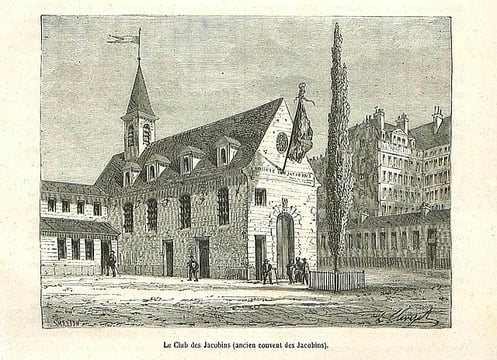

Named after their meeting place in Paris, France, Saint Jacques Monastery, The Jacobin Club would rise to prominence as the leading political movement at the beginning of the French Revolution (1789-99), and its members would be known as Jacobins, a name synonymous with Dominicans in France.
The name Jacobin and even Jacobinism have been used multiple times throughout French history.
The Jacobins are known by many names including Club Breton, Société des amis de la Constitution (Society of the Friends of the Constitution), Society of the Jacobins, Friends of Freedom and Equality, and eventually the Jacobin Club then Jacobin.
Known for its predominantly leftist revolutionary politics and its fervent association with the sans-culottes (the common social class), the Jacobins flourished until 1794, until their name was subtly removed from history. Some say the group was overtaken by later revolutionary groups. I see a more nefarious order. Commonly, each political group that identifies with Marxism, Anarchism, Socialism, and Communism, all illustrates a path of descent from the Jacobins.
Jacobinism referred to the politics of the Jacobins from France in 1789-94. Beginning in 1793 it referred to acts carried out under policies of the Reign of Terror movement under Maximilien Robespierre and the Montagnard. Jacobinism became synonymous with Robespierrism.
It had two factions within the main framework of the Jacobin Club. Those two factions were known as the Montagnard (The Mountain) and the Girondins. The Jacobins continued their dominance by leading the French against the Kingdoms of Austria and Prussia, as King Louis XVI, Marie-Antoinette, and their children fled Paris in an attempt to reach the Hapsburg land and safety. Austria and Prussia invaded France in response to the revolution, and the Jacobins knew if the Hapsburgs won, the King would be reinstated. Louis XVI and Marie-Antoinette, who was a Hapsburg, were married to fuse the divide between the French and Hapsburg royal families.
The Jacobins overthrew King Louis XVI and established the French First Republic, which was later taken over by its partner group the Montagnard, and its leader, Maximilien Robespierre, who held the government until July 1794. The King and Royal Family were captured at the Austria-Prussia border and returned to France, where the King would face the Guillotine, at the hands of the revolution.
The Montagnard government executed 17,000 opponents across France, trying to suppress the Vendee insurrection and Federalist revolts. In July 1794, Robespierre was stripped of his powers and executed along with 21 of his associates. The Jacobin Club ceased to exist by November 1794. In modern-day France, a Jacobin is now known for moderate authoritarianism and is hard pressed against state dissolution.
The Beginning of the Jacobin Club
The Estates-General of 1789
This was the 1st calling of the Estates-General since 1614.
It was suggested to call the Estates-General by the Assembly of Notables, who were appointed to their positions by Louis XVI in February of 1787, due to the Parliament in Paris refusing to ratify a financial reform program by Charles Alexandre de Calonne, in regard to special interests of noble members of the Assembly.
Calonne was the Controller-General of Finances, appointed by Louis XVI to address and repair the state deficit of France, who was hoping to bypass the Assembly and revive the old and outdated institution. Calonne was eventually dismissed from the Assembly in April 1787 and subsequently banished after proposing a land tax in France. He would continue to comment from London.


Let's take a look at what Merriam-Webster says a deficit is:
Deficit – 1) deficiency in amount or quality 2) a lack or impairment in ability or functional capacity 3) an excess of expenditure over revenue 4) a loss in operations
Deficit | Meriam-Webster | Viewed on: 9/19/2022 | https://www.merriam-webster.com/dictionary/deficit
The President of the Assembly of Notables, Étienne Charles de Loménie de Brienne, assumed Calonne’s position of the Controller-General of Finances when he became Prime Minister. The Notables still refused to grant the King’s money. Lafayette was the first to call for a national assembly to address the problem, meaning the Estates-General. The King then dissolved the Assembly, which moved all their proposals to the Parliament. However, the parliament who is supposed to carry on the King’s edicts simply wanted to resume the talks of the Assembly, which was systematically beyond their function.
Loménie sent the new tax proposed by Calonne along with a stamp tax, which was based on the one in America. The Parliament refused to legalize them and demanded to see the royal account registry as a prior condition. The King refused, and several meetings of Parliament were ordered by the King. Once in Versailles and again at Troyes, Champagne, where the taxes were halted and assured the continuation of loaning money to the state. On August 7th, the Parliament stated that only the Estates-General could declare taxes.
There were a total of 137 nobles that made up the Assembly of Notables, including revolutionaries like Comte de Mirabeau, a ruined noble, and Marquis de Lafayette, who had played a very specific role in the American Revolution, commanding American troops in an alliance between France and the American colonies. When Louis XVI called the Estates-General of 1789 to meet at his Palace of Versailles, which was a meeting of all the assemblies of France including clergy, nobility, as well as commoners, The Jacobins who were from the isle of Brittany were in attendance, represented as the Club Breton.
Honoré Gabriel Riqueti, Comte de Mirabeau, a scandalous noble with a ruined reputation that was in the employment of not only Louis XVI but also France’s enemy Austria, was a Jacobin from the beginning and in attendance to the Estates General. Other early members included Abbé Sieyès, Dauphiné deputy Antoine Barnave, Jérôme Pétion, the Abbé Grégoire, Charles Lameth, Alexandre Lameth, Artois deputy Robespierre, the Duc d’Aiguillon, and La Revellière-Lépeaux.
Leading Cause of the King's Deficit & the French Revolution
France’s money problems really began due to money spent during the 7 Years’ War with Britain and then their contributions to the American Revolution.
The Seven Year's War
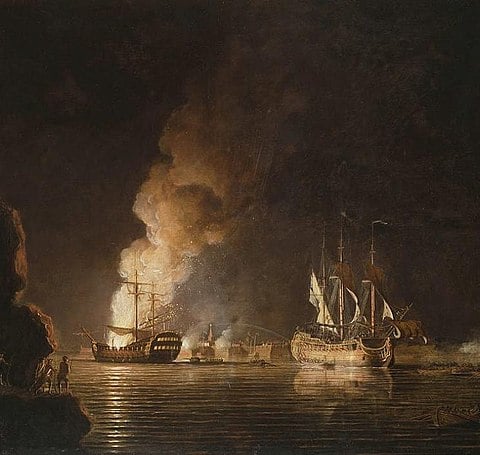

The 7 Years’ War occurred between 1756-1763, and was a global conflict, taking place across 5 continents. Though typically in the history books, the 7 Years’ War is listed separately, The French and Indian War was a part of the 7 Years’ War.
Known by Winston Churchill as the real ‘first world war’, England would eventually declare war on France in 1756, after years of skirmishes between England, Spain, France, Austria-Prussia, Russia, Sweden, and North America.
England, France, and Spain were battling over colonial territory in the New World, and Frederick the Great of Prussia would battle Austria, France, Russia, and Sweden, which caused 2 main fronts for the French.
The Treaty of Hubertusburg would increase Prussia’s power within the European continent, and The Treaty of Paris marked colonial lines, giving the majority of territory to the British, which would cause the French to intervene in the American Revolution.
The final cost to France of the 7 Years’ War would be 1.3 billion livres added to the deficit of the country.
The American Revolution
The French saw the American Revolution as an opportunity to get back at their British adversaries, for territories that they’d lost during the 7 Years’ War.
The French helped America greatly during the conflict by giving money, troops, commanders, and ships to battle the British fleet, which had been dominating colonial waters. The French Foreign Minister, Comte de Vergennes, pressed Louis XVI to support the American Revolution, stating that ”providence had marked out this moment for the humiliation of England.”
Enlightenment philosophers from France provided the ideology for the American revolution, such as Jean-Jacques Rousseau, whose writings were a major influence on Patrick Henry as he rang out with, “Give me liberty or give me death!” It was seen as patriotic to study French Enlightenment philosophers as France was the de-facto enemy of Great Britain, the enemy of the American Revolution. Rousseau was the leading philosopher who brought forth the idea that sovereignty was in the people and not the monarchy. The U.S. Constitution even showed elements of French philosophy as it mirrored the writings ‘The Spirit of the Laws’ by Baron de Montesquieu, which stated that despotism was only avoided by a government with checks and balances.
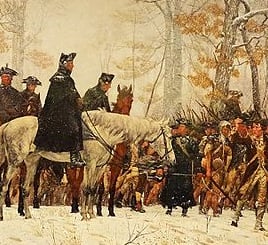

In December 1775, Benjamin Franklin met with a secret envoy from France, led by Julien-Alexandre de Bonvouloir. This formalized the secret bond between America and France and solidify their relationship which predated the formal 1778 treaties, that were signed between the two countries. Silas Deane was sent to France searching for military leadership and strategists, clothing, arms, ammunition, and food stores for 25,000 troops, and credit from France to help pay for it all. He had succeeded, and France would become a dedicated supporter in secret to the American Revolution. By November 1776, the cooperation would be unveiled with Benjamin Franklin’s personal envoy to Paris.
The total donations from France to the newly formed United States were roughly 1.3 billion livres, 12,000 French soldiers, 22,000 mariners, 63 warships, and recognition for political legitimacy.
October March of 1789
The October March of 1789 was a March on Versailles and was the earliest event of the French Revolution. Also known as the Women’s March on Versailles, it began among women in the marketplaces of Paris, who eventually began rioting over the high price of a loaf of bread on October 5th, 1789. The riot was swiftly captured by the revolutionaries who were seeking liberal political reforms and a change of government to a constitutional monarchy and utilized for their cause.
Encouraged by these revolutionaries, the mob grew in number to several thousand people. They charged the city armory and took weapons and marched onto the Palace of Versailles. In a violent confrontation with the royalty at the palace, they were successful in imposing their demands on King Louis XVI and forced him and his family back to Paris along with the majority of the French Assembly.
The March of 1789 started a new period in France. The King was no longer an independent ruler, and privileged orders of the French nobility were changed to the commoners, who were collectively known as the Third Estate.
The cause of the October March of 1789 actually spawned from The Flour War in 1775 which was a wave of riots which were sparked by high grain prices during the Ancien Regime (Old Regime) of the Capetian dynasty which continued, through a branch of Bourbons, the old Frankish Carolingian dynasty of Charlemagne and the Holy Roman Empire. The Flour War ended when the Controller-General of Finances imposed wheat price controls, which ended in famine, and deployed troops to quell the rioting.
The Jacobin Club Moves to Paris
Following the March of 1789, The Jacobin Club which had regressed back to a National Constituent Assembly of deputies from the isle of Brittany was re-created as the Société de la Révolution, mainly inspired by a letter sent by the Revolutionary Society of London congratulating the French for regaining their liberty.
I will go into detail on the Revolution Society of London in a later article, but they were very influential amongst the revolutionaries of Europe.
To accommodate its rapidly growing numbers, the group rented a room at the monastery of the Jacobins in the Rue Saint-Honoré, which was close to the seat of the Assembly. Though they were already known as Jacobins, they changed their name again in January calling themselves Société des amis de la Constitution, named after their first official house in Paris, and the Dominicans who occupy it.
After it established itself in Paris, the club began to rapidly grow in number as it opened its membership to include others besides deputies. All citizens of France were allowed to enter, excluding women, and even some foreigners like Arthur Young, an agrarian improvement expert, and critic of British reform, were allowed to join.
Inspired by the revolution in America, the Jacobin Club meetings soon became a place for radical change that pushed for some of the same ideals as the American Revolution including separation of church and state, standardized education, and the right to vote for all citizens.
Soon the club would elect its first president, the Duc d’Aiguillon. The rules and regulations of the club would be drawn up by Antoine Pierre Joseph Marie Barnave and Honoré Mirabeau, along with the Club’s objectives.
The Club became formally constituted in France on February 8th, 1790, after adopting Barnave’s rules and regulations, which are listed below.
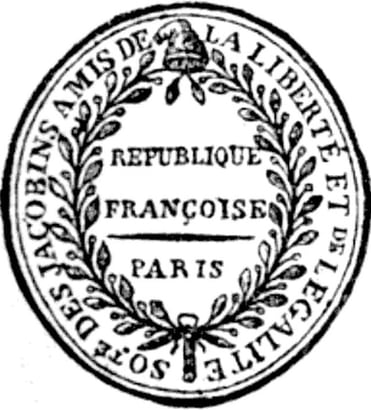

1. Pre-Discussion of topics that will be brought to and decided upon in the National Assembly, in advance.
2. In the spirit of the preamble, build towards an established, strengthened Constitution
3. The establishment and communication of other societies in the realm with like-minded goals.
It doesn’t sound very nefarious, and honestly, it sounds like they based their objectives much on the ideals of the American Revolution. Let’s continue digging.
Every month, the club would elect a new president, 4 secretaries, a treasure, and several committees were to be founded which would oversee presentations, elections, correspondence, and administration.
Any member who demonstrated a will of principle that was not aligned with the constitution and the rights of man would be banished.
Soon, with the introduction of the club’s 7th article, they would begin to admit as members, entire groups of other societies from around France to maintain contact. In just 5 months, by August 10th, 1790, there were approximately 152 club-affiliated organizations across the country. Through various attempts at counter-revolution, by the end of 1791, the Jacobin Club branched all throughout France. At its highest point, there were 7,000 chartered clubs with an estimated 500,000 members. Though it was very widespread, it was highly centralized and contained, which gave the Jacobins their power and leverage.
Though the Jacobins claimed to speak on behalf of the people, they were not of the people. Women were allowed to listen from the balconies but not allowed to participate, and at the highest levels of membership, only well-off men were privy to the goings on. Often these higher levels would be filled with the bourgeoisie. The Club in France was exclusively French bourgeoisie, including the lawyer Robespierre, brewer Santerre, the son of the Duc d’Orleans, Louis Philippe who would also become the King of France.
Only half of the Jacobins even supported the monarchy on paper up until the end. They did not support the petition of July 17th, 1791, which called for the King’s removal. They instead advocated for a new King to be selected, while the other side advocated for the King’s removal, trial, and punishment.
The Growing Division in the Jacobin Club
Towards the latter half of 1791, some Jacobins in the Legislative Assembly were advocating war against Prussia and Austria, a theme that would continue to dominate through the first part of the 20th Century. The leading Jacobin calling for action was Jacques Pierre Brissot, and other prominent members followed while those following Maximilien Robespierre were against it, though he was not seated in the Legislative Assembly.
Robespierre called the Jacobins who were promoting war, ‘the faction from the Gironde’, though not all were from the department of Gironde, a prefect of Bordeaux.
In April 1792, the Legislative Assembly voted for war with Prussia and Austria, and thus began the split of the Jacobins. The two inner groups were known as ‘The Montagnards’ who were led by Robespierre, and the ‘Girondins’ who began to distance themselves from the Jacobin Club.
Upon the fall of Louis XVI’s monarchy in France on September 21st, 1792, and the adoption of France’s Constitution, the title of the Jacobin Club was changed to Société des Jacobins, amis de la liberté et de l’égalité (Society of Jacobins, Friends of Freedom, and Equality), and Robespierre rose to prominence at the center of the National Convention, along with his protégé Louis Antoine de Saint-Just, Marat, and Danton, along with others. By September 1792, while dominating the Legislative Assembly, also became the voice of the Jacobin Club.
The new Legislative Assembly in France seated Robespierre’s Montagnard on one side and their opponents, the Girondins, on the other. Though they never had any political status, the two groups were close in number with the Montagnards having 120 members and the Girondins having 150 members. The remaining assembly, who were not in the first two groups, were known as ‘the Plain’ and showed great ascension in debates as the Montagnards and Girondins bickered between each other.
The Plain, also known as the Toads, the Marsh, and the Maraisards, received their name because their seats were on the debating floor, below the Montagnards and Girondins. I will also go into a more in-depth study of this group at a later date.
The Banning of the Girondin
In April 1793, a call for banning the Girondin from the National Convention was called by the Minister of War, Jean-Nicolas Pache. Towards the end of April, Marguerite-Élie Guadet, a Girondin, accused Jean-Paul Marat, a Montagnard, of calling for murder and plunder and a personal call to ‘destroy the sovereignty of the people.’ A call for trial was quickly initiated, and Marat was swiftly acquitted. This further engulfed the rivalry between the 2 factions in flames, and the Montagnard moved closer to the ban of Girondins.
On May 18th and 25th of 1793, the convention president who was a Girondin, warned that the rivalry in the convention would lead the country to anarchy and civil war, and made the threat, “If anything should befall to the representatives of the nation, I declare, in the name of France, that all of Paris will be obliterated.”
Robespierre was quick to state in the Jacobin Club that the people should stand against the corrupt deputies in the convention. By April 27th, both groups were accusing the other of inciting a civil war.
On June 2nd, 1793, 80,000 armed soldiers entered the Tuileries Palace, at the hand of the Montagnard. In a very chaotic session, the 22 leading Girondins were expelled from the convention by decree, and Robespierre would earn the nickname of l’Incorruptible (The Incorruptible).
The French Civil War
By this time, the Montagnard under the leadership of Robespierre had gained great power in France, but not all of them were considered Jacobins.
Powerful Montagnards
Jacobin
Jean-Marie Collot d’Herbois, Jacques-Nicolas Billaud-Varenne, Jean-Paul Marat, Georges Jacques Danton, Louis Antoine Léon de Saint-Just, Joseph Fouché, 1st Duc d’Otrante, 1st, & Comte Fouché.
Non-Jacobin
Bertrand Barère de Vieuzac, Jacques René Hébert, & Georges Auguste Couthon.
These individual Montagnards, some Jacobin and some not, either entered or were already a part of the executive government of France. Those that were serving in the Committee of Public Prosperity include the following:
Bertrand Barère de Vieuzac April 1793 – October 1793 ~ Georges Jacques Danton April 1793 – July 1793 ~ Georges Auguste Couthon May 1793 – Death ~ Louis Antoine Léon de Saint-Just May 1793 – Death ~ Maximilien Robespierre July 1793 – Death ~ Jean-Marie Collot d’Herbois September 1793 – Death ~ Jacques-Nicolas Billaud-Varenne September 1793 – Death.
Some of the removed Girondin Jacobins left Paris to organize revolts in many of the existing departments against opposition political groups, mainly the Montagnards, which had seized power over France. Some of them are listed below:
Jean-Marie Roland de la Platière, Jacques Pierre Brissot, Jérôme Pétion de Villeneuve, Jean-Baptiste Louvet de Couvray, François Nicolas Léonard Buzot, & Marguerite-Élie Guadet
These revolts were termed ‘Federalist Revolts’; However, this is an incorrect statement as most were not fighting for regional autonomy, but in fact, wanted to dissolve the new Republic and begin again with another type.
Robespierre’s Death Streak
October 1793
21 former Girondin Jacobin Convention deputies were sentenced to death for inciting an insurrection in Caen.
March 1794
Fellow Montagnards, Jacques René Hébert & some of his followers were sentenced to death after being labeled by Robespierre as internal enemies and promotors of tyranny.
April 1794
Fellow Montagnards, Georges Jacques Danton & some of his followers were sentenced to death also after being labeled by Robespierre as internal enemies and promotors of tyranny.
Between September 1793 and July 1794
The Montagnard government would label and sentence to death some 17,000 individuals, who they said were enemies of freedom.
June 1974
3 individuals on the Committee of Public Prosperity and Safety, labeled Robespierre a dictator. They included the following: Jacques-Nicolas Billaud-Varenne, Jean-Marie Collot d’Herbois, and Lazare Nicolas Marguerite, Count Carnot
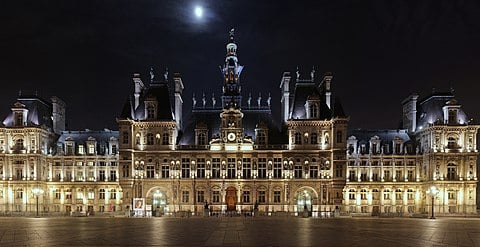

Louis Legendre was dispatched with a group of military troops to arrest the Montagnards at the Hôtel de Ville, where the Montagnards had been meeting on Saturday night, on July 28th, 1974.
Following their arrest, Robespierre and other Montagnard Jacobins were sentenced to death by guillotine by the National Convention.
The End of the Reign of Terror & The Thermidorian Reaction
Following the execution of Robespierre and the Montagnards and Jacobins, began a period which is known as the Thermidorian Reaction.
It was the end of the bloodshed, the end of decentralized executive powers from the Committee of Public Prosperity and Safety, and a political shift from leftist Jacobin policies to a more conservative position.
Preferring a more stable power at the seat of the government, the newly formed French Directory would abandon economic and general populism, dechristianization which was also demanded by the Jacobins due to corruption of the Catholic Church, and harsh wartime measures.
The reaction itself was not without bloodshed, as it saw the left being oppressed by sheer brutal force, which included murder. The Jacobin Club was now at an end and disbanded. The sans-culottes (the common class) were dispersed, and all Montagnard ideology was renounced and banned.
The Attempted Re-Organization
An attempt at reunification by Paul François Jean Nicolas, Vicomte de Barras, was attempted in July 1799, under the name Réunion d’amis de l’égalité et de la liberté and headquartered in Salle du Manège of the Tuileries, formally known as the Club du Manège. The group consisted of around 250 members of the two councils of the legislature, which included many notable ex-Jacobins.
Its publication, called Journal des Libres, claimed that the culmination of policies under Robespierre was straight and true, attacking the newly formed French Directory as a royauté pentarchique (royal patronage). The revival was soon suppressed, sometimes violently, and the new Club du Manège disbanded and gave its support to none other than Napoleon Bonaparte.
Jacobinism Today
I stumbled on a website, during my research for this article, and have found a site which is utilizing the name Jacobin.
I stumbled on a website, during my research for this article, and have found a site which is utilizing the name Jacobin.
According to similarweb.com, a website that lists traffic statistics for any website, the total visits to the site have reached 4.0 million.
The website illustrates support for the “American left, offering socialist perspectives on politics, economics, and culture.” It also claims that it has 70,000+ subscribers and reaches approximately 3 million per month.


Its reviews claim the introduction of light in dark times, something that we have all heard before in a tumultuous period of history.
I dare say none of the viewers and advocates of this website have any idea of the capabilities of the Jacobin ideals and are completely unaware of Jacobin origins. They literally know not what they do.
Author’s Commentary
Though the Jacobins were avid promotors of patriotism and liberty and extended that to the French population, the Jacobins were able to illustrate, very effectively, that once a single power gained control, that power has the utmost potential to become a tyrant. It does not matter if that power is left or right, idealistically.
Sometimes people from the right and left all call for centralized authority and banning the other, but it is this divide that keeps politics in check and disallows the return of events, such as this. A system of checks and balances is indeed required to prevent any form of despotism as stated by Baron de Montesquieu.
I even propose this is what the Bolsheviks identified so well actually. It is human nature, that once you eliminate the voice of your opposition, the urgency to eliminate the opposition becomes increasingly important, so as to not let the opposition permeate like an infectious virus. This is why a foundation built on Godly principles and a strong Godly moral code is so very important. When humans are left unchecked, we are vicious disgusting creatures. The only human that is capable of fully loving all in spite of the differences in people, is Jesus Christ. Only Jesus Christ can lead humans to a prosperous future, as he is now sitting at the right hand of God advocating for our place in Heaven.
We as humans walked away from the theocracy set up by God in Moses’ day, thus further propagating the continual fall of man through sin. Keep in mind, this is official history and not some mystical religion. Until man regains his roots as Jesus Christ the King, a system of checks and balances must always remain in place. If not, we will destroy each other. Lord, please have mercy on us. We have no idea what we are doing.
I do ask you as a Christian, and fellow human being, if you encounter anyone with radical or revolutionary ideals, turn away. We are called to obey authority and not overthrow it. Only God can install and remove governments. This must be understood. Certainly, we could leave and start our own somewhere, but while in Rome, you must abide by Rome’s rules. This is precisely why I believe the American Revolution was so successful.
Always remember, God first, Submit to God’s will, and repent.
